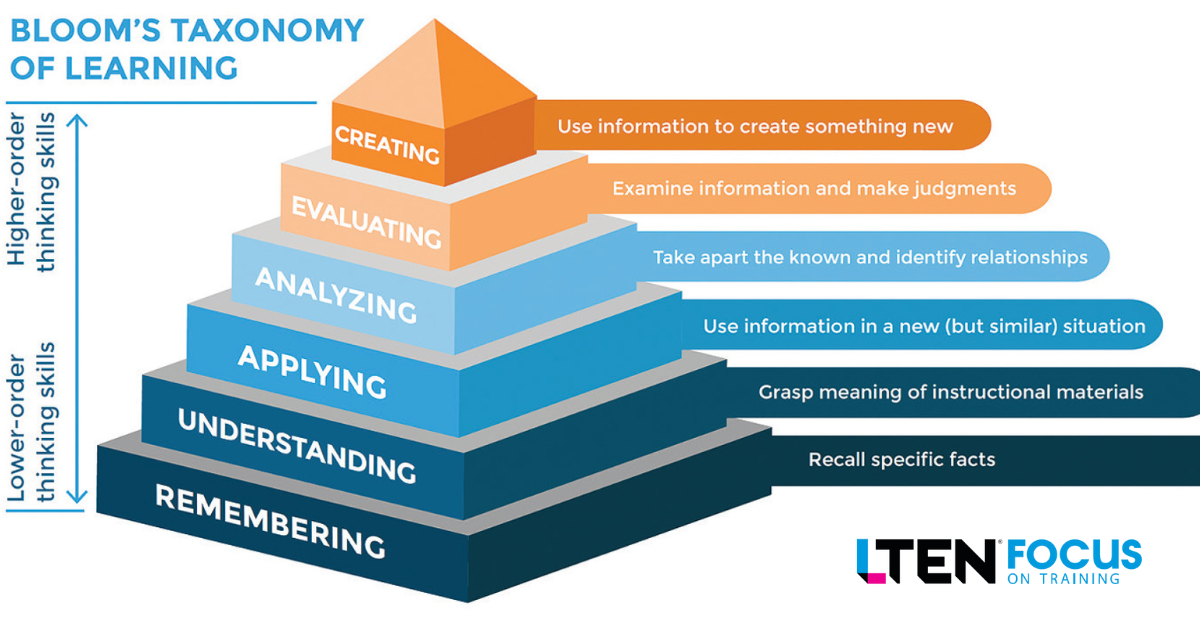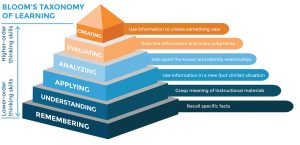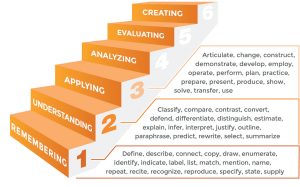
Training Basics – By Dorothy H. Wood, Ph.D., and Andy Gunning
The famed levels of learning can be steppingstones to success
Have drug, will sell. Easy, right? Perhaps not. Having a good drug plus a salesforce doesn’t necessarily equal substantial sales. What could be missing? Consider this scenario:
Sales or marketing leadership comes to you, the trainer, and says, “The salesforce is not effectively selling with our clinical reprints.” At first glance, that seems like a no-brainer. Train them a bit more on the clinical trial details and you should be good to go, right?
However, there is a good chance it might not be as straightforward as it seems. You may need to take a closer look at your training regimen with a focus on Bloom’s Taxonomy of Learning.
What Is Bloom’s Taxonomy of Learning?
In 1956, Benjamin Bloom and his colleagues devised a system for categorizing educational goals. It has been tweaked over time, but the framework remains the same: Build a pyramid of learning competencies beginning with a solid foundation of knowledge, creating a learning continuum using effective training tools and assessments.
There are six levels to Bloom’s hierarchy. (See Figure 1.)
Each hierarchical level is associated with a series of verbs that, when used in a pedagogical environment, guide the learner through increasingly sophisticated skills. (See Figure 2.)
No one disputes that this strategy is invaluable for grade school and higher education, but how does Bloom’s cognitive taxonomy apply to the life sciences industry? Is it relevant? Is it valuable?
Using the Levels
Let’s revisit our original predicament: “The salesforce is not effectively selling with our clinical reprints.”
The immediate inclination is to tackle the issue head-on using Bloom’s Level 1. The salesforce must be lacking the knowledge to effectively convey the clinical trial data to the physician. In response to that conclusion, we develop learning outcomes using verbs associated with Level 1; define, describe, list, recall, state, etc.
If the sales force already has a solid foundation in clinical trial data, however, the additional training will be time-consuming and redundant.
The risk we take when we convey the complex information required to sell a drug –such as mechanism of action, pharmacokinetics, clinical trial endpoints and statistics – is the expectation that the information should be memorized, but comprehension is not essential. Using Bloom’s Level 2 verbs to create learning outcomes elevates the rep’s confidence when answering questions posed by the physician.
Consider the verbs compare and contrast. These provide an excellent opportunity for reps to explain how a drug is both similar to, and differs from, an endogenous ligand to bring about the desired physiological effect. Understanding a mechanism of action, rather than simply memorizing statements, can be transformative in a selling situation.
Appropriate Actions
What if, however, the issue is not with the salesforce’s ability to retain and comprehend the clinical trial knowledge, but rather a lack of experience applying the knowledge in a sales situation? Creating learning outcomes using verbs associated with Bloom’s Level 3 – demonstrate, prepare, inform, instruct, initiate, etc. — becomes instrumental in refocusing the training.
Implementation of training strategies that target these outcomes via workshops, virtual instructor-led training and role play, for example, changes the training focus entirely and gets to the root of the problem. Competency of the outcomes can be assessed through appropriate certification activities.
Let’s take a deeper dive into Bloom’s Level 3: Apply. This level clearly shows that it’s not enough to know the information, the learner must be able to take what they have learned and apply it to a specific scenario. Pertinent to pharmaceutical sales, we can further divide this into two sub-levels: cognitive application and performance application.
Cognitive application of the clinical trial data means the sales rep can plan how to use the data to assess the suitability of their drug for a particular physician/practice/patient, further employ the data to support their conclusion and construct a strategy in preparation for a meeting with the physician.
Performance application strengthens the rep’s ability to present the clinical trial information to a physician, demonstrate confidence in the benefits of prescribing the drug, and clearly articulate the information.
As this example shows us, it is important to recognize that the solution to a slump in sales is likely not a “one size fits all” scenario. Evaluating the source of the problem is an important step in developing appropriate training materials. Arguably, outcomes developed using Bloom’s Levels 4, 5 and 6 may be overkill for life sciences sales, but differentiating between, and utilizing Levels 1, 2 and 3 in the correct circumstances may elevate your training and significantly reinvigorate your sales force.
Conclusion
In summary, when developing training materials, think about the adage, “It’s not where you start, it’s where you finish.” If the end goal is to have your trainees pass a multiple-choice test on the packaging insert, then Level 1-based learning outcomes would be appropriate. After all, the base of the pyramid is a solid foundation of core knowledge.
If, however, the expectation is that the sales reps will be able to confidently sell a drug to physicians either virtually or face-to-face in a healthcare facility, then learning outcomes that appropriately reflect those expectations should be thoughtfully developed. Comprehension of the materials using Bloom’s Level 2verbs will boost the reps’ ability to confidently answer any questions a physician may pose.
Moreover, assessments that include Bloom’s Level 3 cognitive and performance application will ensure that reps have the necessary practice to engage in an assertive dialogue with the provider.

 Dorothy H. Wood, Ph.D., is curriculum design consultant for Education and Training Systems International. Andy Gunning is CEO, Education and Training Systems International. Email Andy at andy.gunning@edtsi.com.
Dorothy H. Wood, Ph.D., is curriculum design consultant for Education and Training Systems International. Andy Gunning is CEO, Education and Training Systems International. Email Andy at andy.gunning@edtsi.com.










